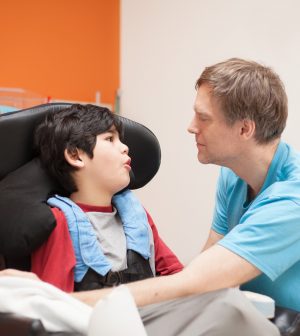- Could Your Grocery Store Meat Be Causing Recurring UTIs?
- Are You Making This Expensive Thermostat Error This Winter?
- Recognizing the Signs of Hypothyroidism
- 10 Strategies to Overcome Insomnia
- Could Artificial Sweeteners Be Aging the Brain Faster?
- Techniques for Soothing Your Nervous System
- Does the Water in Your House Smell Funny? Here’s Why
- Can a Daily Dose of Apple Cider Vinegar Actually Aid Weight Loss?
- 6 Health Beverages That Can Actually Spike Your Blood Sugar
- Treatment Options for Social Anxiety Disorder
‘Like She Was Not Even There’: Children With Disabilities Face Discrimination in Health Care

Children with disabilities are discriminated against in health care settings — to the detriment of their health, according to their parents.
Thirty in-depth interviews with parents of children with disabilities revealed a disturbingly common thread.
“They mistreated her and treated her like a robot. Every single time a nurse walked in the room, they treated her like she was not even there,” said one mother who was asked about her child’s health care encounters.
Researchers at University of Utah Health, who led the study, said the attitudes described by parents could result in substandard medical treatment and poor health outcomes.
The parents and other family caregivers who were interviewed were from 15 U.S. states and looked after children with medically complex conditions. Most of the children needed health care more than 20 times a year.
The study did not measure how common it is for clinicians to show bias against children with disability, but it exposes a serious problem, said lead author Dr. Stefanie Ames, a critical care physician at U of U Health.
“Our goal was to validate families’ experiences and bring awareness to the issue,” Ames said in a university news release.
Family caregivers saw the drivers of discrimination as lack of knowledge about how to care for children with complex medical needs, lack of interest because the child might not have been deemed worthy of care, and negative assumptions based on the child’s disability and quality of life.
The discrimination resulted in limited accommodations, such as for wheelchairs, and unequal care for children with disabilities compared to those without disabilities. Providers also treated children in a dehumanizing way and differently from the way they would typically developing kids, according to the interviews.
This sometimes affected patient care. In one case, for example, a caregiver said the doctor recommended against treating her daughter’s cancer despite a high chance that the treatment would work.
Another parent said health care providers did not give her child adequate pain relievers before carrying out an uncomfortable medical procedure.
“My perception is that [clinicians] wanted to take care of the patients that didn’t have a severe, special need … They just seemed like they didn’t even care to treat [my daughter],” said one child’s mother.
This reveals an urgent need for additional medical training in caring for people with disability, the authors said.
“I believe that all health care providers choose this line of work because of the common goal of helping those in need,” said senior author Dr. Nancy Murphy, a professor of pediatrics at the University of Utah School of Medicine. “Yet when providers lack the knowledge, experience or resources to render care, we tend to shy away from situations. This tends to happen without our awareness, and this research brings this issue into clear view.”
The findings were published online June 26 in the journal Pediatrics.
More information
Michigan Medicine has more on discrimination in health care.
SOURCE: University of Utah Health, news release, June 26, 2023
Source: HealthDay
Copyright © 2026 HealthDay. All rights reserved.










